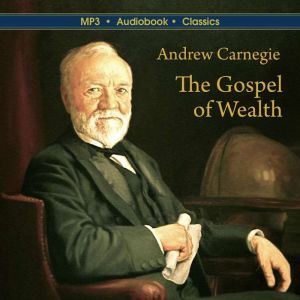

The Gospel of Wealth
Author: Andrew Carnegie
Narrator: Douglas Harvey
Unabridged: 39 min
Format: Digital Audiobook Download
Publisher: Author's Republic
Published: 06/02/2020
Categories: Nonfiction, Business & Economics, Personal Finance


Author: Andrew Carnegie
Narrator: Douglas Harvey
Unabridged: 39 min
Format: Digital Audiobook Download
Publisher: Author's Republic
Published: 06/02/2020
Categories: Nonfiction, Business & Economics, Personal Finance
Andrew Carnegie was born in 1835 in Scotland. He immigrated to the United States and by 1889 he owned Carnegie Steel Corporation, the largest of its kind in the world. In 1901 he sold his business and dedicated his time to expanding his philanthropic work, including the establishment of Carnegie-Mellon University in 1904.
I love how his optimism in life really comes through in his writings. He never says anything bad about anyone and always has a positive outlook on things. I think he would have been an enjoyable person to be around. Before reading this book, I assumed he was a stuck-up rich guy (being incredibly wea......more
I enjoyed this autobiography of the second richest man in the world from a bit over a hundred years ago. Carnegie's book, while written around the turn of the century, feels much more modern. At times, I had the feel I got when reading Sloan's "My Years with General Motors", which was written 40 yea......more
This book was available with my audible subscription, it was an interesting look into the rise of one of the wealthiest men of his time, and how he gave most of it away before his death. The last chapter was the most interesting as he was both a staunch proponent of both capitalism and the death tax......more
I really enjoyed this book. I found it very encouraging as a business owner. My two major takeaways were: 1) Put all of your eggs in one basket - then watch that basket. He argues that YOUR business is the best one to invest in. Focus on your expertise - beware of diversification. 2) There is not much......more
An inspiring an instructive glimpse of the industrialization of 19th century America Andrew Carnegie, born in Scotland in 1835, arrived in America at the age of 13, in reduced circumstances but with years of schooling behind him. Thanks to this education and to the devotion of his parents, he develop......more